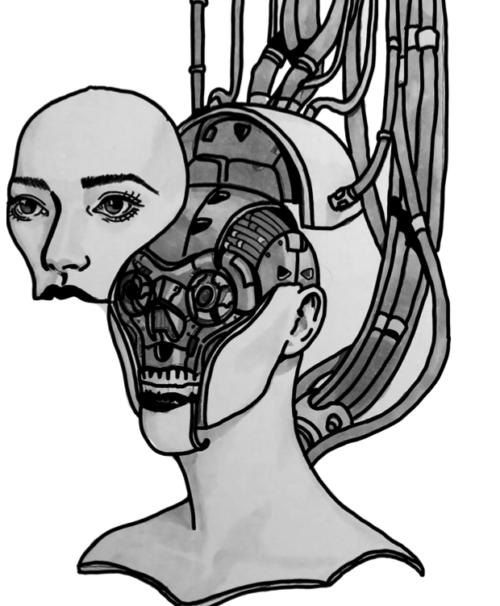Even after 50 years, Harvard University has retained its top-ranked reputation. The year is 2073, but humans still make up the student body rather than robots. However, instead of Harvard student-athletes scootering to class, they now can teleport, pleasantly out of our way.
While many believed the downfall of humanity would be the rapid development of AI, many overlooked the continued development of the competitive environment on college campuses, particularly Harvard. The race to perfection has become so imperative that students will take any measure to stand out amongst the crowd. It’s not just about being the smartest anymore. It’s about trying to stay ahead, trying to beat out the growing competition in a world where information is so freely accessible. And technological advancement has finally made this possible, leading to the Harvard Procedure.
When the surgery was first offered by HUHS, many students and people across the world were extremely against it. The “procedure” contradicted everything it meant to be a human being, celebrating one another’s strengths and weaknesses. However, no one was allowed to speak out about it here on campus. In fact, no one is allowed to speak out about anything anymore, or they will receive official public cancellation. Some things at Harvard never changed, including the roaches and the rats. Only these rodents are no longer rats. They’ve been replaced by cameras and audio recorders waiting to catch the next victim who slips up and says something cancel-worthy. Such public distress and fear of cancellation led HUHS to hire the top surgeons around the country and begin running test trials.
The “procedure” started off simple. Enhance the brains of students to their maximum possible intelligence level. The requirements were loose; you just needed to be a Harvard student. Of course, when the first test trial student got his “procedure” done, he was finally able to get 100s on his p-sets without “collaborating,” and so the rest of his classmates quickly followed in his footsteps. As expected, the entire class performed perfectly on all assignments, leaving the professor with only one choice left to make: get the “procedure” themselves. As the domino effect spiraled out of control, students began to realize they were no longer competing over who was the smartest. There were many more aspects of their personalities that needed to be enhanced in order to stay on top at this school.
At a university with some of the most Type A students in the world, no one would expect the competition to be the race towards the most humor or charisma. Especially since now students couldn’t joke about politics or current events, the challenge of making someone laugh was harder than ever before. If you thought comping the Lampoon or punching a Final Club was cut-throat in 2023, imagine the process in 2073. The only way for those students who have never been bullied to compete with their funniest peers was to get the “procedure.” The “procedure” made you both hilarious and witty. It slowly became an issue when everyone who got the “procedure” started telling the same jokes, having the opposite effect of wanting to stand out from the crowd. The “procedure” led to the downfall of SideChat, as everyone created the same memes. The fall 2073 Lampoon comp had 432 compers, and only let in 2.
While the “procedure” of course had an option to enhance one’s entire physical appearance, it was the least popular out of them all. Students became so infatuated with changing their brains, that their looks became the only thing they had left of their true selves. In 2073, Tinder users began adding which “procedures” they had received in order to appeal to those looking for humor, intellect, or cordiality. But, when students finally matched and met up for a date, they realized they had nothing to talk about, as everyone’s unique personalities had been stripped away. If dating life was non-existent in 2023, imagine it 50 years later. 60% of Harvard students in 2073 voted that dating another student just felt like dating a robot, and most of the time, the actual robot would be the hotter option.
Harvard students should take this glimpse into the future as a sign to appreciate all that makes you you. At a campus where it feels like we’ve all been unknowingly signed up for “Harvard’s Got Talent,” it’s hard to not imagine what clubs you’d be able to join or what internship you’d be able to get if you had the ability to say the perfect thing at the perfect time. But, that would just make every student more boring. So, embrace your flaws before you’ll have the opportunity to get rid of them all.
Ilana Feder ’26 (ilanafeder@college.harvard.edu) writes Arts for the Independent.

